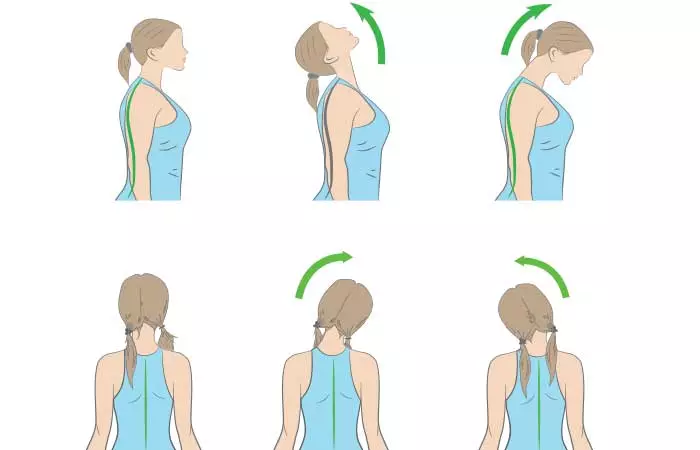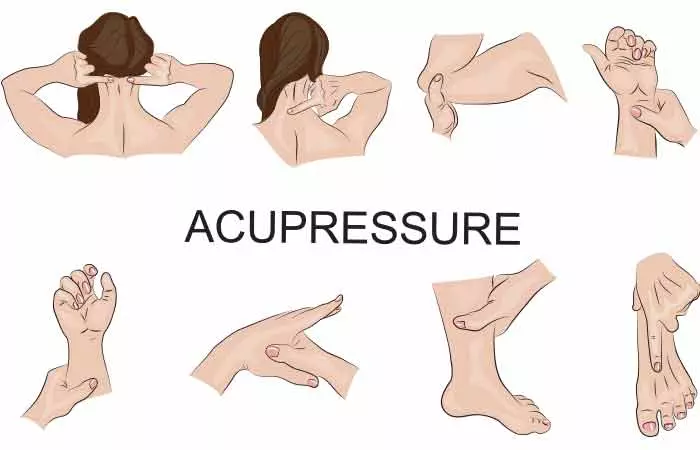What Is A Pinched Nerve?
A pinched nerve is the result of too much pressure applied by the surrounding bones, muscles, cartilage, or tendons on a nerve or group of nerves. This pressure causes the nerve to lose its function and might result in pain or numbness in the affected area. Neck pain is also called cervical radiculopathy and the pain experienced at the topmost part of the spine is called cervical radiculitis. Your nerves extend all the way from the brain to the spinal cord, sending important messages back and forth. A pinched or compressed nerve may produce signals in the form of pain, and such signs should not be ignored as they may lead to hand weakness.
Signs And Symptoms Of A Pinched Nerve
Other than pain, a pinched or compressed nerve may also give rise to symptoms such as:
Numbness in the area A sharp pain that radiates outwards A tingling or pins and needles sensation Weakened muscles in the affected area A feeling of numb and sensationless hands or feet
These symptoms might worsen while you are asleep. If you have a compressed nerve in your neck or arm, it may affect your elbows, hands, wrists, and even your fingers. This often leads to conditions like:
Peripheral neuropathyi A medical condition that damages the nerves in the hands, arms, and feet leading to weakness and pain as a result of diabetes, infections and injuries. Carpal tunnel syndrome Thyroid disease
Let us now look at the causes of a pinched nerve.
What Causes A Pinched Nerve In The Neck?
The pinched nerve in your neck could be due to the following:
An injury Arthritis (cervical spondylosis and cervical disc degeneration) Stress Physical activities Obesity
If your nerve is pinched or compressed only for a short time, it isn’t usually a cause for concern. But if it continues to be compressed for a long period, it may result in chronic pain and even result in a permanently damaged nerve. Aleksa Georg, a blogger, battling neck pain for nine months, detailed her experience thus: “At first, it began showing up in the bed — mostly when I was laying down on one side or the other. This new irritating sensation felt just as something there was being pinched very, very [nastily]. The desire to crack this thing and get my neck mobility back to normal built up as the pain advanced and moved into my practice on the mat, and later on in my daily life as well (i).” She was later diagnosed with a displaced cervical disc. Occupational cervical radiculopathy is also a common case these days. According to an online survey conducted with 685 orthopedic surgeons, it was found that neck pain and cervical radiculopathy are common among orthopedic surgeons. Of the 685 responses, 59.3% reported neck pain, and 22.8% reported cervical radiculopathy. The following conditions might increase your risk of experiencing a pinched nerve:
Rheumatoid arthritisi A chronic inflammatory disorder that triggers the immune system to attack its own healthy tissues in the joints of hands and feet causing pain and inflammation. (cervical osteoarthritis) Cervical herniated disc Thyroid disease Cervical stenosis Bone spursi Also known as osteophyte, these are bony projections or lumps that form on bones around the spine and in joints as a response to arthritis and old age. that occur as a result of trauma or other medical conditions Sexual activity, which increases a woman’s risk of developing carpal tunnel syndrome (1). This, in turn, increases the risk of getting a pinched nerve.
Hence, to avoid damaging your nerve permanently, it is important to attend to it immediately. And we have the best solutions to address this problem. Simply follow the methods given below to treat your pinched nerve at home.
How To Fix A Pinched Nerve In The Neck
1. Hot Or Cold Compress
Ice cubes A clean washcloth A sealable plastic bag A hot compress
You may do this every hour or two until there is a notable decrease in your pain. While a cold compress can help relieve the pain and inflammation, a hot compress can relax the muscles around the pinched nerve (2). It can also improve the blood circulation to your neck, thus aiding faster healing of the affected nerve.
2. Massage With Warm Oil
1/2 cup of coconut or mustard oil You can do this at least twice daily. Massaging the affected area activates certain pressure points that help relax your muscles and increase blood supply to the neck to reduce cervical nerve compression. A warm oil massage can also reduce the pain, and hence, it is one of the best and most effective options for treating a pinched nerve in the neck (3).
3. Essential Oils
a. Peppermint Oil
2-3 drops of peppermint oil Coconut or jojoba oil (optional)
You can do this twice daily. Peppermint oil is widely used as a decongestant and also to relieve pain, given its wonderful analgesic and anti-inflammatory properties (4). It is also antispasmodic and can help in relaxing the muscles to relieve neck muscle spasms. These properties of peppermint oil can help in the treatment of the pinched nerve in your neck.
b. Lavender Oil
2-3 drops of lavender oil Coconut or olive oil (optional)
You can do this 2 to 3 times daily. While the pleasant aroma of lavender oil improves your sleep and helps you get ample amounts of rest, its analgesic and anti-inflammatory properties help in reducing the pain and inflammation that are caused due to a pinched nerve (5), (6).
4. Ginger
1 inch of sliced ginger 1 cup of hot water Honey
You must drink ginger tea 2 to 3 times daily. Ginger is an herb that is quite popular for its pain-relieving properties (7). It possesses anti-inflammatory and analgesic properties that can help relieve chronic pain and inflammation that occur due to the pinched nerve (8).
5. Vitamins
A deficiency in vitamins B6, B12, C, and E may increase your chance of developing a pinched nerve. Hence, it is important to get the required dose of these vitamins every day to aid faster healing. Increase your intake of these vitamins by consuming foods rich in them like citrus fruits, green vegetables, almonds, avocados, seafood, and poultry. All these vitamins have anti-inflammatory and analgesic properties that can help lessen the pain (9), (10), (11), (12).
6. Turmeric
1 teaspoon of turmeric powder 1 glass of milk Honey (optional)
Drink turmeric milk 1 to 2 times daily. The curcumin in turmeric possesses anti-inflammatory and healing properties that can help treat the pinched nerve (13), (14).
7. Epsom Salt
1 cup of Epsom salt Bathwater
Do this 2 to 3 times a week for effective results. Epsom salt contains magnesium, which is widely used to treat pain and inflammation due to its anti-inflammatory properties (15). An Epsom salt bath can help your skin absorb more magnesium and relieve the symptoms of pain and inflammation caused by the pinched nerve in your neck (16).
8. Castor Oil
1/2-1 tablespoon of castor oil A warm compress
Do this 2 to 3 times a day until your pain begins to subside. Castor oil is well-known for its potential anti-inflammatory and relaxing properties. This is mainly due to the presence of ricinoleic acid in it. Therefore, a quick massage or application of a castor oil pack is one of your best bets to deal with pinched nerves (17).
9. Exercises
15 to 20 Doing a few stretches is all it takes to relax the stiff muscles in the neck and relieve the pain that a pinched nerve causes, which can be particularly beneficial for a stiff neck (18).
10. Yoga
Practise yoga poses like the Cobra Pose, Extended Side Angle Pose, Fish Pose, and Downward Dog Pose. Hold each pose for 10 to 15 seconds. Yoga can help stretch the muscles in the neck, thereby inducing relaxation and speeding up the healing process of the pinched nerve and might help relieve pain due to cervical arthritis. It also improves blood supply to the affected nerve, thus aiding its recovery (19).
11. Acupressure
You might also want to consider acupressure to help treat the pinched nerve in your neck along with cervical disc protrusion, which involves applying pressure to certain points in your body. It not only relieves pain but might also help the nerve regain its lost function (20).
Preventive Tips
Maintain good body posture. Avoid staying in one position for a long time. Exercise regularly. Maintain a healthy weight and follow a healthy diet.
Keep reading to learn other treatment methods you may consider to manage a pinched nerve.
Other Treatment Options For A Pinched Nerve In The Neck
The doctor may recommend the following treatment courses to improve your condition:
Resting allows the neck to heal and reduces strain. Physical therapy targets pain areas, strengthens muscles, and enhances flexibility. A soft collar provides neck support, restricting unnecessary movement. Surgery relieves nerve pressure in persistent or severe cases. Medications like nonsteroidal anti-inflammatory drugs (NSAIDs) or oral corticosteroids can help reduce inflammation and provide pain relief. Doctors may inject corticosteroids into the affected area to manage more severe cases. Surgical interventions like cervical decompression or discectomy help relieve nerve compression for persistent or severe symptoms.
Always consult a healthcare expert for a proper diagnosis and tailored treatment approach. Additionally, you may follow some sitting and sleeping positions to speed up your recovery. Check them out in the next section!
Best Sleeping And Sitting Positions For A Pinched Nerve In The Neck
Keep pillows under your neck and knees to keep your backbone as straight as possible. A proper sitting position can also take a lot of pressure off your back. Sit on chairs that support your back. Avoid sitting for too long and take frequent breaks if you are required to sit at a stretch.
Try these remedies and methods to reduce the swelling and pain. However, if your problem persists, you need to consult a doctor immediately.
When To Visit A Doctor
You need to visit a doctor if you experience these symptoms:
Persistent and unbearable pain despite treatment Acute focal weakness (when one of your legs is unable to carry your weight) A profound loss of sensation in any of your body parts Loss of bladder or bowel control
How long does a pinched nerve take to heal? A pinched nerve may take anywhere from a few weeks to a few months to heal completely. Can a chiropractor fix a pinched nerve? Chiropractic treatments usually help in taking pressure off the pinched nerve, which, in turn, provides relief from the painful symptoms. Is surgery necessary for a pinched nerve in the neck? Surgery for a pinched nerve is the last resort when other non-surgical treatments do not show any improvement. Mostly pinched nerve symptoms suffice with rest, hot press, and medication. Can physical therapy help with a pinched nerve in the neck? Physical therapy can indeed assist with a pinched neck nerve. Physical therapy can ease discomfort, increase the range of motion, and stop additional injury by bolstering the muscles surrounding the injured location. Can a pinched nerve in the neck lead to permanent nerve damage? A pinched nerve in the neck can potentially lead to permanent nerve damage if left untreated for an extended period of time (17). Learn about the symptoms and treatments for a pinched nerve in the neck. Watch this video to identify the issue as well as tips on how to relieve the pain and discomfort.


















